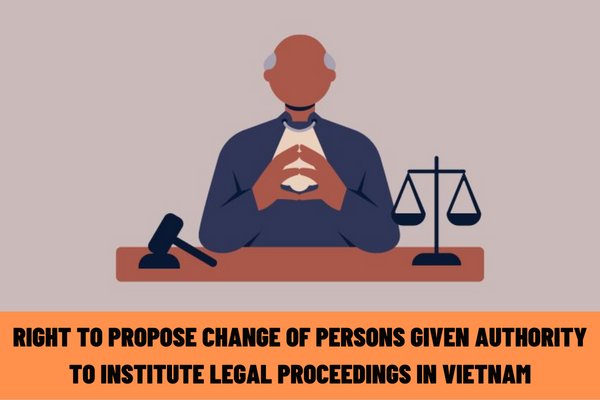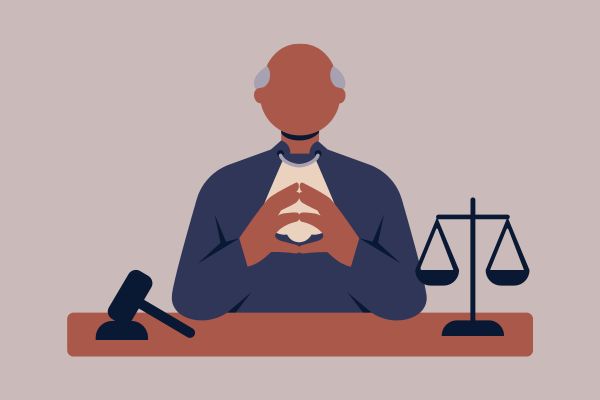Who has the right to propose change of persons given authority to institute legal proceedings in Vietnam? In what cases will presiding officers be replaced?
- Who are presiding officers in criminal proceedings in Vietnam?
- What are the cases of disapproval or replacement of persons given authority to institute legal proceedings in Vietnam?
- Who has the right to propose change of persons given authority to institute legal proceedings in Vietnam?
- In what cases will the prosecutors, judges and investigators be replaced?
- What are the duties and authority of a judge in criminal proceedings in Vietnam?
Who are presiding officers in criminal proceedings in Vietnam?
Pursuant to Article 34 of the 2015 Criminal Procedure Code of Vietnam stipulating as follows:
Presiding authorities and presiding officers
1. Presiding authorities are:
a) Investigation authorities;
b) Procuracy;
c) Courts.
2. Presiding officers are:
a) Heads and vice heads of investigation authorities and investigators and investigation officers;
b) Heads and vice heads of The procuracy, procurators and checkers;
c) Court presidents, Vice court presidents, judges, lay assessors, Court clerks, verifiers.
Thus, presiding officers are:
- Heads and vice heads of investigation authorities and investigators and investigation officers;
- Heads and vice heads of The procuracy, procurators and checkers;
- Court presidents, Vice court presidents, judges, lay assessors, Court clerks, verifiers.

Who has the right to propose change of persons given authority to institute legal proceedings in Vietnam? In what cases will presiding officers be replaced?
What are the cases of disapproval or replacement of persons given authority to institute legal proceedings in Vietnam?
Pursuant to Article 49 of the 2015 Criminal Procedure Code of Vietnam on disapproval or replacement of persons given authority to institute legal proceedings as follows:
Disapproval or replacement of persons given authority to institute legal proceedings
Persons given authority to institute legal procedure must refuse to engage in proceedings or submit to replacement in the following events:
1. They are crime victims, litigants, or delegates, relatives of crime victims, litigants, suspects or defendants;
2. They have acted as defense counsels, witness testifiers, verifiers, valuators, interpreters or translators in the lawsuits;
3. Clear grounds of their potential bias at work are found.
Thus, persons given authority to institute legal procedure must refuse to engage in proceedings or submit to replacement in the following events:
- They are crime victims, litigants, or delegates, relatives of crime victims, litigants, suspects or defendants;
- They have acted as defense counsels, witness testifiers, verifiers, valuators, interpreters or translators in the lawsuits;
- Clear grounds of their potential bias at work are found.
Who has the right to propose change of persons given authority to institute legal proceedings in Vietnam?
Pursuant to Article 50 of the 2015 Criminal Procedure Code of Vietnam stipulating as follows:
Individuals having the right to propose change of persons given authority to institute legal proceedings
1. Procurators.
2. Detainees, suspects, defendants, crime victims, civil plaintiffs, civil defendants and their representatives.
3. Defense counsels and protectors of legitimate rights and benefits for crime victims, civil plaintiffs and defendants.
Thus, individuals having the right to propose change of persons given authority to institute legal proceedings include:
- Procurators.
- Detainees, suspects, defendants, crime victims, civil plaintiffs, civil defendants and their representatives.
- Defense counsels and protectors of legitimate rights and benefits for crime victims, civil plaintiffs and defendants.
In what cases will the prosecutors, judges and investigators be replaced?
Pursuant to Articles 51, 52 and 53 of the 2015 Criminal Procedure Code of Vietnam, procurators or judges will be replaced in one of the following cases:
- They are crime victims, litigants, or delegates, relatives of crime victims, litigants, suspects or defendants;
- They have acted as defense counsels, witness testifiers, verifiers, valuators, interpreters or translators in the lawsuits;
- Clear grounds of their potential bias at work are found.
- Procurators have engaged in legal proceedings of the lawsuit as procurators, checkers, judges, lay assessors, verifiers or Court clerks.
- Judges appear in the same trial panel and biologically related to each other;
- Judges have heard cases in first-instance or appellate Courts or engaged in legal proceedings in such Courts as investigators, investigation officers, procurators, checkers, verifiers or Court clerks.
- Investigators have engaged in legal proceedings of the lawsuit as procurators, checkers, judges, lay assessors, verifiers or Court clerks.
What are the duties and authority of a judge in criminal proceedings in Vietnam?
Pursuant to Article 45 of the 2015 Criminal Procedure Code of Vietnam stipulating as follows:
Duties, authority and responsibilities of Judge
1. A judge, when assigned to hear criminal cases, bears the following duties and authority:
a) Examine case files prior to the start of a trial;
b) Hear cases;
c) Engage in other activities of legal procedure and vote on matters within the powers of the Trial panel;
d) Transact other activities of legal procedure within the Court’s powers as per The court president’s assignments.
2. The presiding judge has the duties and powers as stipulated in Section 1 of this Article and below:
a) Decide to implement, alter and abort preventive and coercive measures, save those for detention;
b) Decide to return case files for further investigation;
c) Decide to have cases heard; to dismiss or adjourn lawsuits;
d) Manage the hearing of cases, oral arguments in court;
dd) Decide to have expert examinations started newly or afresh or extended, to perform experimental investigations; to change or have expert witnesses replaced; to order valuation or have valuators changed;
e) Order or requisition the appointment or change of defense counsels; change of supervisors for perpetrators under 18; request the appointment and replacement of translators and interpreters;
g) Decide to summon witness testifiers to the Court;
h) Engage in other duties and powers of legal procedure within the Court’s powers as per The court president’s assignments according to this Law.
3. Judges shall be held liable under the laws for their actions and decisions.
Thus, the judge will have the duties, authority and responsibilities specified above in criminal proceedings.
LawNet
